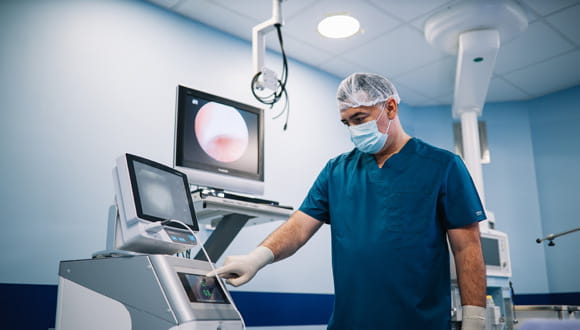Colonoscopy is a common test used to discover a variety of gastrointestinal issues. Most people know it for its use in detecting colorectal cancer and finding and treating precancerous growths. That said, some balk at "the prep" required for the test, while others might be uncomfortable with the idea of a tiny camera being used to look inside their colon. While colonoscopy is the best tool available to find colorectal cancer, it's only effective if the test gets done. When caught early, colorectal cancer has a 90% survival rate.
So when should you talk to your doctor about getting a colonoscopy?
What is a colonoscopy?
During a colonoscopy, a patient is usually placed under sedation, and a small camera is used to examine the entirety of the colon and rectum to look for polyps or any other abnormalities. The test is a fairly simple procedure that usually takes less than 30 minutes to complete.
A patient will need to completely empty their bowels before the procedure by drinking a solution. Completing the prep gives doctors the best chance to find cancer and treat precancerous lesions called polyps. Most colorectal cancers start as polyps. If your prep is incomplete, you'll likely be asked to reschedule your colonoscopy.
"Colonoscopies also serve as a preventative measure," says Dr. Jean Knapps, a colorectal surgeon at Houston Methodist. "If we find something like a polyp, we can remove it immediately."
Despite what you may have heard, colonoscopy prep doesn't have to be a terrible experience. When scheduling a colonoscopy, talk to your doctor about ways you could make the prep easier. Whether it's drinking half the prep solution the day before and half the day of your colonoscopy, drinking it cold, or using a flavored drink powder such as Crystal Light, your doctor likely knows all the tricks to making the prep as easy as can be.
After a colonoscopy, Dr. Knapps emphasizes that patients can go home the same day and resume their normal diet and activities right away.
Why (and when) you need a colonoscopy
You've turned 45 years-old
The American Cancer Society and U.S. Preventive Services Task Force recommend that people with average risk for colorectal cancer start screening at age 45. In addition to a colonoscopy, there are other colon cancer screening tests that people at average risk can complete, including:
- Stool DNA test — a sample of your stool will be examined for genetic mutations and blood products in the stool.
- CT colonography (virtual colonoscopy) — X-rays and a CT scan are used to make pictures of the inside of the colon and rectum.
- Fecal immunochemical test (FIT) or guaiac-based fecal occult blood test (gFOBT) — a sample of your stool will be examined for hidden blood.
- Flexible sigmoidoscopy, much like a colonoscopy — doctors use a device to examine inside the rectum and lower colon.
Talk to your doctor about your individual risk and the screening type you'd be most comfortable with. But it's important to note that colonoscopy is considered the gold standard for colorectal cancer screening.
"A 20-minute procedure can prevent a lot of grief down the road," Dr. Knapps emphasized.
You're at increased risk of colon cancer
Certain conditions and medical history make people more at risk of developing colorectal cancer. If you're at higher risk, you may have to have your first colonoscopy before age 45. You might be at higher risk if:
- You have a family history of colorectal cancer: If your parent or sibling was diagnosed before they turned 50, you're at an even higher risk. People with family history should receive their first colonoscopy at age 40 or 10 years before the age their family member was diagnosed. (If your parent was diagnosed at 42, you should begin your screenings at age 32.)
- You experience inflammatory bowel disease (IBD): Crohn's disease or ulcerative colitis can increase your risk of developing colon cancer. People with IBD may need to start having colon cancer screening colonoscopy eight to 10 years after their diagnosis and follow up every two to three years depending on how long they've lived with IBD.
- You have a history of polyps or a previous colorectal cancer diagnosis: If you've ever had polyps removed during a colonoscopy or have had a previous colorectal cancer diagnosis, your doctor may recommend having a colonoscopy performed as often as yearly or up to five years between colonoscopies.
- You have a genetic condition such as familial adenomatous polyposis (FAP) or Lynch syndrome, also called hereditary nonpolyposis colorectal cancer (HNPCC): People with these conditions may have to get their first colonoscopy as early as ages 10 to 12 and continue screening every one to two years depending on individual risk factors.
You're having digestive symptoms
While colon cancer screening is usually the reason why someone gets a colonoscopy, the test is also used to screen for a variety of gastrointestinal conditions. Colonoscopy is used as testing for conditions including:
- Bleeding in the gastrointestinal tract
- Diverticulitis, pouches of inflammation in the digestive tract
- Hemorrhoids
- Inflammatory bowel diseases, including Crohn's disease and ulcerative colitis
- Irritable bowel syndrome
- Strictures (narrow areas of the colon)
- Ulcers
Gastrointestinal conditions can share symptoms with colon cancer. So it's better to be safe and talk with your doctor to understand any symptoms you're having. If you experience any of these, see your doctor right away:
- Abdominal pain, bloating or cramps
- Bright red or black stool
- Changes in stool appearance
- Changes in bowel habits, such as new constipation or diarrhea
- Exhaustion
- Unexplained weight loss
"Oftentimes people dismiss the symptoms of colorectal cancer until it's too late," Dr. Knapps says. "They attribute blood loss to a hemorrhoid or something they ate. But when symptoms become more chronic, you need to get checked out by your doctor."








